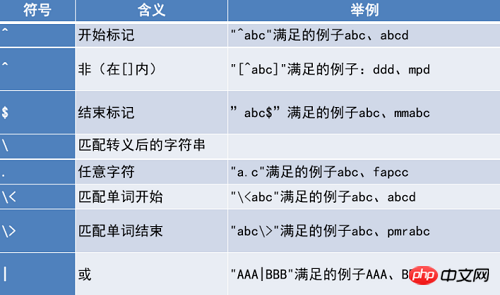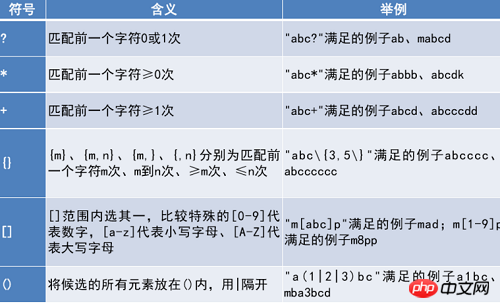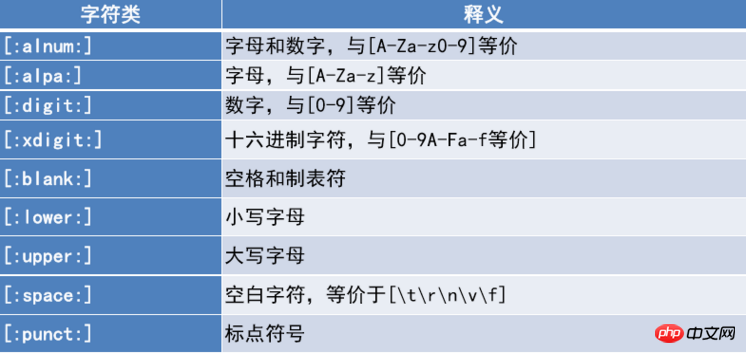正規表達式是在檔案中符合符合條件的字串的。以下透過本文來介紹linux下的通配符與正規表示式,需要的朋友參考下吧
##通配符
* 任意字元,可重複多次 ? 任意字元,重複一次
[] 代表一個字元
#正規表示式##正規表示式是在檔案中符合符合條件的字串的
ls find cp是不支援正規表示式的
但是grep awk sed支援正規表示式
[root@hadoop-bigdata01 test]# touch aa [root@hadoop-bigdata01 test]# touch aab aabb [root@hadoop-bigdata01 test]# ll total 0 -rw-r--r-- 1 root root 0 May 16 19:47 aa -rw-r--r-- 1 root root 0 May 16 19:47 aab -rw-r--r-- 1 root root 0 May 16 19:47 aabb [root@hadoop-bigdata01 test]# ls aa aa [root@hadoop-bigdata01 test]# ls aa? aab [root@hadoop-bigdata01 test]# ls aa* aa aab aabb
正則表達式式
特殊字元 正規表示式符合範圍
正規表示式符合範圍
##正規表示式標準字元
使用正規表示式
grep "1" /etc/passwd
[root@hadoop-bigdata01 test]# grep "1" /etc/passwd bin:x:1:1:bin:/bin:/sbin/nologin mail:x:8:12:mail:/var/spool/mail:/sbin/nologin uucp:x:10:14:uucp:/var/spool/uucp:/sbin/nologin operator:x:11:0:operator:/root:/sbin/nologin games:x:12:100:games:/usr/games:/sbin/nologin gopher:x:13:30:gopher:/var/gopher:/sbin/nologin ftp:x:14:50:FTP User:/var/ftp:/sbin/nologin dbus:x:81:81:System message bus:/:/sbin/nologin usbmuxd:x:113:113:usbmuxd user:/:/sbin/nologin avahi-autoipd:x:170:170:Avahi IPv4LL Stack:/var/lib/avahi-autoipd:/sbin/nologin abrt:x:173:173::/etc/abrt:/sbin/nologin wang:x:501:501::/home/wang:/bin/bash grep 'root' /etc/passwd cat /etc/passwd | grep 'root'
grep '[0-9]' /etc/passwd
grep '[0-9][0-9][0-9]' /etc/passwd 或者 grep ':[0-9][0-9][0-9]:' /etc/passwd
[root@hadoop-bigdata01 test]# grep '[0-9][0-9][0-9]' /etc/passwd games:x:12:100:games:/usr/games:/sbin/nologin usbmuxd:x:113:113:usbmuxd user:/:/sbin/nologin rtkit:x:499:497:RealtimeKit:/proc:/sbin/nologin avahi-autoipd:x:170:170:Avahi IPv4LL Stack:/var/lib/avahi-autoipd:/sbin/nologin abrt:x:173:173::/etc/abrt:/sbin/nologin nfsnobody:x:65534:65534:Anonymous NFS User:/var/lib/nfs:/sbin/nologin saslauth:x:498:76:"Saslauthd user":/var/empty/saslauth:/sbin/nologin pulse:x:497:496:PulseAudio System Daemon:/var/run/pulse:/sbin/nologin liucheng:x:500:500::/home/liucheng:/bin/bash wang:x:501:501::/home/wang:/bin/bas
3.符合以r開頭n結尾的行
grep '^r.*n$' /etc/passwd .*代表所有 [root@hadoop-bigdata01 test]# grep '^r.*n$' /etc/passwd rpc:x:32:32:Rpcbind Daemon:/var/cache/rpcbind:/sbin/nologin rtkit:x:499:497:RealtimeKit:/proc:/sbin/nologin rpcuser:x:29:29:RPC Service User:/var/lib/nfs:/sbin/nologin
config ,截取ip#grep -v 代表反向截取,意思是移除某關鍵字的行 sed有替換的意思
[root@hadoop-bigdata01 test]# ifconfig | grep 'inet addr:'
inet addr:192.168.126.191 Bcast:192.168.126.255 Mask:255.255.255.0
inet addr:127.0.0.1 Mask:255.0.0.0
[root@hadoop-bigdata01 test]#
[root@hadoop-bigdata01 test]# ifconfig | grep 'inet addr:' | grep -v '127.0.0.1'
inet addr:192.168.126.191 Bcast:192.168.126.255 Mask:255.255.255.0
[root@hadoop-bigdata01 test]# ifconfig | grep 'inet addr:' | grep -v '127.0.0.1' | sed 's/inet addr://g'
192.168.126.191 Bcast:192.168.126.255 Mask:255.255.255.0
[root@hadoop-bigdata01 test]# ifconfig | grep 'inet addr:' | grep -v '127.0.0.1' | sed 's/inet addr://g' | sed 's/Bcast.*//g'
192.168.126.191這裡有個誤解,想了好久,是正規表示式和通配符的區別我們知道通配符的*指的是任意字元,可重複多次正規表示式的*指的是匹配前一個字元>=0次這兩個是完全不同的,那如何知道我用的*是通配符還是正則表達式起初我陷入一個誤區,看下面這串指令
[root@hadoop-bigdata01 test]# touch ac aac abc abbc [root@hadoop-bigdata01 test]# ll total 0 -rw-r--r-- 1 root root 0 May 16 19:55 aac -rw-r--r-- 1 root root 0 May 16 19:55 abbc -rw-r--r-- 1 root root 0 May 16 19:55 abc -rw-r--r-- 1 root root 0 May 16 19:55 ac [root@hadoop-bigdata01 test]# ls | grep 'a*c' aac abbc abc ac [root@hadoop-bigdata01 test]# ls | grep 'a.*c' aac abbc abc ac [root@hadoop-bigdata01 test]# ls | grep '^a.*c' aac abbc abc ac [root@hadoop-bigdata01 test]# ls | grep '^a*c' aac ac
[root@hadoop-bigdata01 test]# ls a aac abb abbc abc ac b bb c cb [root@hadoop-bigdata01 test]# ls | grep 'a*b' abb abbc abc b bb cb
以上是關於linux下通配符以及正規表示式的詳解(圖)的詳細內容。更多資訊請關注PHP中文網其他相關文章!




